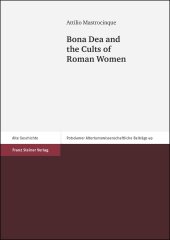 Neuerscheinungen 2014Stand: 2020-02-01 |
Schnellsuche
ISBN/Stichwort/Autor
|
Herderstraße 10
10625 Berlin
Tel.: 030 315 714 16
Fax 030 315 714 14
info@buchspektrum.de |

Attilio Mastrocinque
Bona Dea and the Cults of Roman Women
2014. 209 p. w. 16 ill. 240 mm
Verlag/Jahr: FRANZ STEINER VERLAG 2014
ISBN: 3-515-10752-5 (3515107525)
Neue ISBN: 978-3-515-10752-5 (9783515107525)
Preis und Lieferzeit: Bitte klicken
Bona Dea, also known as Fauna, was a very important goddess of female initiations in Rome, and several features of hers were shared by similar goddesses in ancient Italy. This book sheds light on two hitherto unexplored features: the Dionysiac character and the Lydian style of her festivals. The wife of a consul took on the attitude and the attire of Omphale as the president of Dionysiac ceremonies. Faunus was supposed to precede Bacchus and give fecundity to the bride (i.e. Ariadne), whereas Hercules was thought of as an effeminate musician who created harmony. This was the correct ritual behaviour of prenuptial ceremonies, as it was depicted on many Dionysiac sarcophagi. The iconography of these monuments depicts important features of Faunus and Fauna. Believers are depicted on sarcophagi in the attitude of Bacchus or, in case of women, of either Ariadne or Omphale. A final comparison with initiations among native tribes of Oceania clarifies many rituals of the ancients.
"excellently executed work" Outi Sihvonen Arctos 49, 2015
Mastrocinque, Attilio
Attilio Mastrocinque, born in Venice 1952. 1981-1987: researcher of Ancient History at the University of Venice. 1987-1995: associated professor of Greek history at the University of Trento. Since 2001: full professor of Roman History at the University of Verona. 1992: Alexander von Humboldt-Stiftung fellowship. 1993: invited professor at the École Normale Supérieure. 2007: invited professor at the École Pratique des Hautes Études. Research Fields: Hellenistic history; Roman history under monarchy and early Republic; religions in Republican Italy and oriental religions in the Roman Empire.


